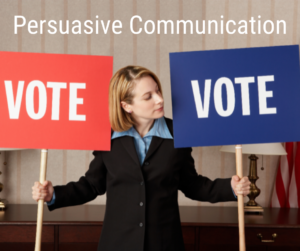Finding The Truth In Persuasive Communication
Persuasive communication entails laying out a claim, then providing evidence and reasoning to support that claim in an effort to move an audience to take a specific action.
Below are several of the most common fallacies that are often used in persuasive arguments. How many of these have you heard or recognize in the political ads you are hearing?
Ad hominem. This fallacy comes from Latin and means “against the man”. This fallacy attacks the messenger and is used to divert attention away from the real issue in an argument. However, not all attacks are ad hominem fallacies as in some cases, a person’s character or integrity can be a legitimate issue.
Either-Or. Also known as a “false dilemma”, this fallacy claims there are only two possible solutions for a particular problem when more alternative solutions exist. For instance, if a claim is made that the only choices are “we either cut services or raise taxes”, questions should be raised as there are possibly more choices than the two that were offered.
Hasty Generalization. This is a common fallacy where a speaker jumps to a conclusion based on limited examples or cases. One negative event, such as an airline disaster, does not necessarily warrant stopping all airline flights. Diving deeper into the causes of the event and looking for a larger sample size can prevent statements that conclude a hasty generalization.
 Bandwagon. This fallacy purportedly has origins in politics as historically, politicians would go through the streets of their districts and try to draw people to support them. Those who chose to support said politicians would literally “jump on their bandwagon”. Hence, the name of this fallacy. Just because an idea is popular, or “everyone” is on board, does not necessarily make it right or good policy.
Bandwagon. This fallacy purportedly has origins in politics as historically, politicians would go through the streets of their districts and try to draw people to support them. Those who chose to support said politicians would literally “jump on their bandwagon”. Hence, the name of this fallacy. Just because an idea is popular, or “everyone” is on board, does not necessarily make it right or good policy.
Slippery Slope. This fallacy assumes that one action will lead to a second action, which will be much worse than the first one. And the second action creates conditions for a third action, which will be much worse than the second action. For instance, if we don’t take action against climate change, we won’t be able to grow food to feed our population. If we can’t grow food, people will starve. If people starve, we will have mass extinction. You can see how the first statement leads to a series of steps that is not backed with evidence and reasoning.
These are just a handful of over 100 fallacies that are listed in the Internet Encyclopedia of Philosophy My overall point here is to create an awareness of how they are used to move an audience. Deceiving an audience can lead to loss of credibility and trustworthiness. And as audience members in these days leading up to election, digging a little deeper to find the evidence behind the claims of a candidate will lead to a more informed action–your vote.
